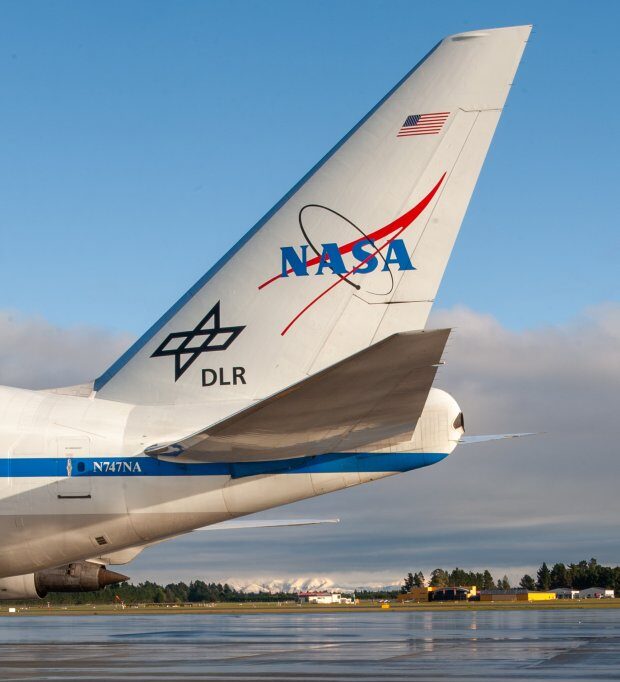Christchurch Airport welcomes flying observatory SOFIA

SOFIA (Stratospheric Observatory of Infrared Astronomy) is making its seventh visit to Christchurch International Airport, showcasing the airport’s capability as a base for space and scientific exploration.
SOFIA is a Boeing 747SP aircraft modified to carry a 2.7 metre reflecting telescope and is spending winter months based at Christchurch Airport. It flies ten-hour overnight missions at 38,000-45,000 feet, above 99 per cent of Earth’s infrared-blocking atmosphere, so astronomers on board can study the solar system and beyond in ways not possible with ground-based telescopes.
“We are thrilled to be returning to Christchurch to continue to study and discover the infrared universe,” said Naseem Rangwala, the SOFIA project scientist.
SOFIA is an 80/20 joint project of NASA and the German Space Agency at DLR. SOFIA has made 12 deployments over its operational lifetime, generally leaving Palmdale, California, to observe celestial objects and phenomena not visible from its home skies.
Christchurch becomes SOFIA’s home-away-from-home when deploying overseas, with its scientists saying they get “sublime science” from Christchurch, when the southern skies are very clear. This time, SOFIA plans to conduct 32 flights to observe a wide range of celestial objects and phenomena, like cosmic magnetic fields, stellar feedback, and cosmic rays, using two instruments, HAWC+ and GREAT.
Many of the key celestial objects for astronomers, like the centre of the Milky Way, are either visible only from the Southern Hemisphere or more easily observed from these latitudes. Three years after SOFIA’s first light in 2010, the observatory made its first trip to New Zealand. Now, nine years later and with six previous trips to Christchurch, this will be SOFIA’s last international deployment.
NASA and DLR recently announced the conclusion of the SOFIA mission. The famous aircraft will operate for the rest of fiscal year 2022, before a two year decommission project begins. Moving forward, SOFIA’s data will be available in NASA’s public archives for astronomers worldwide to use.
“We are committed to delivering a strong finish for this unique astrophysics mission, from a place of strength and pride, by giving our scientific community as much data as possible from the Southern Hemisphere,” Dr. Rangwala said.
Christchurch Airport staff say the world’s largest flying observatory is much loved across the city and South Island. Thousands of its local fans turned out to see it arrive and fans up and down the country have flown to Christchurch in past years just to see and photograph it. It is the only aircraft of its type in the world and fascinates scientists, students and children alike, priceless as a stratospheric explorer and an inspirational visitor.
